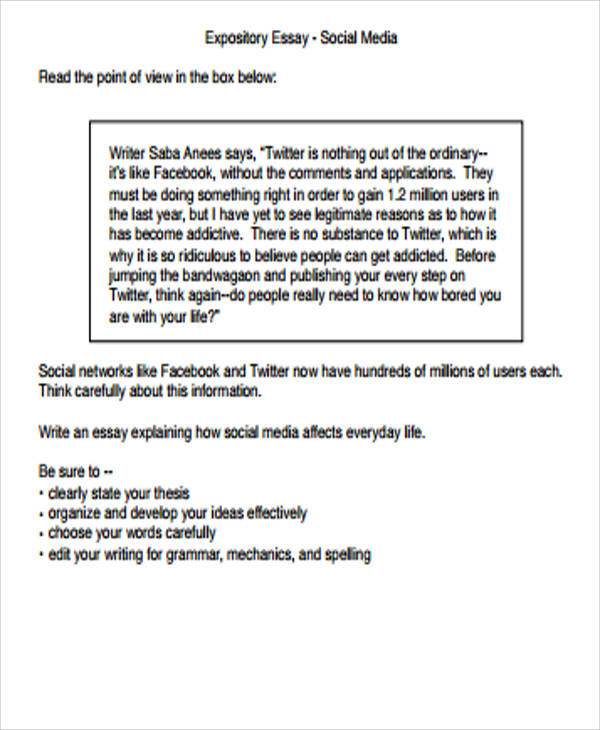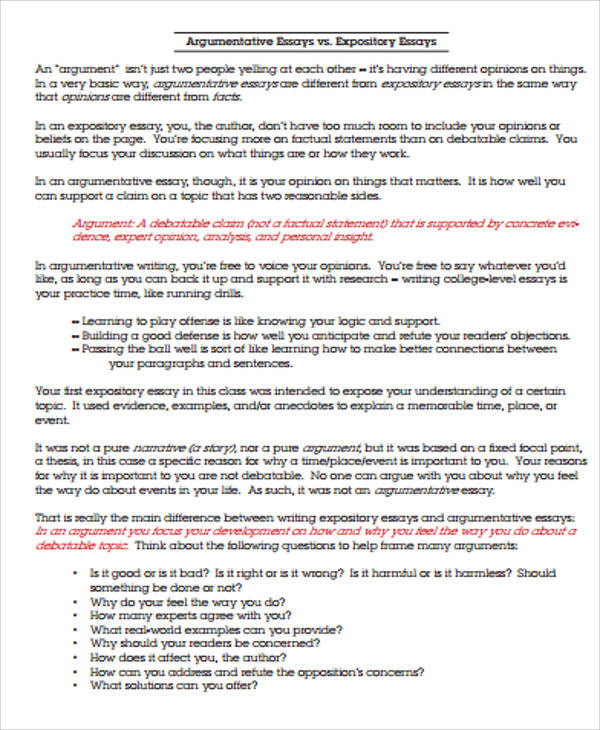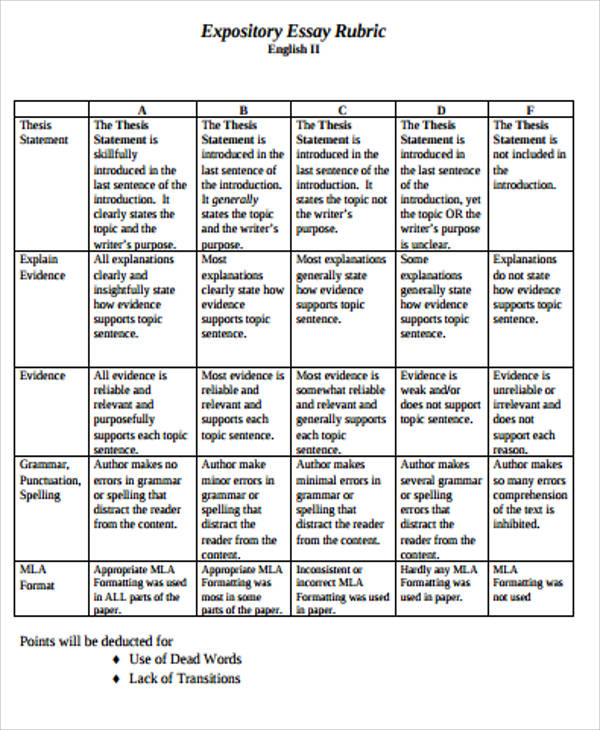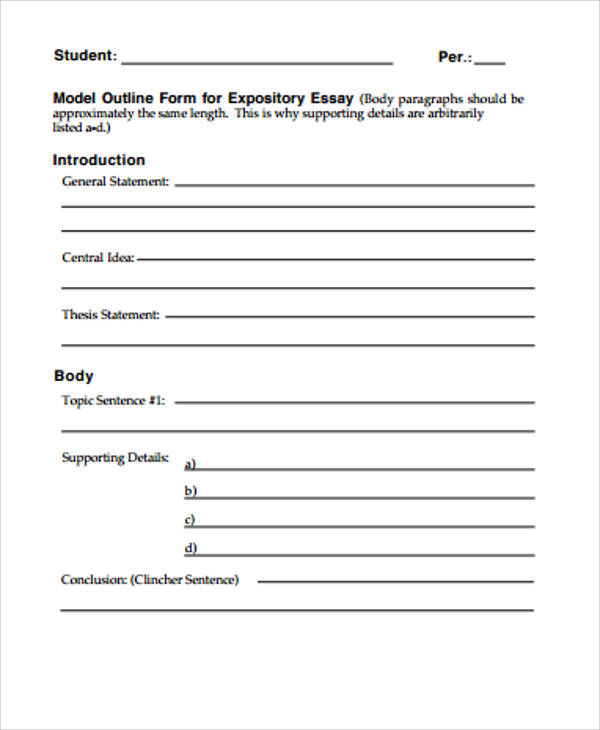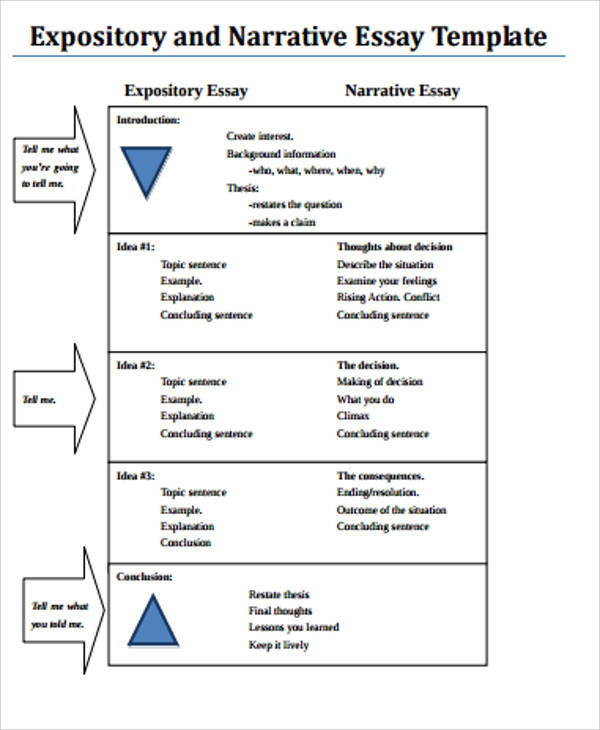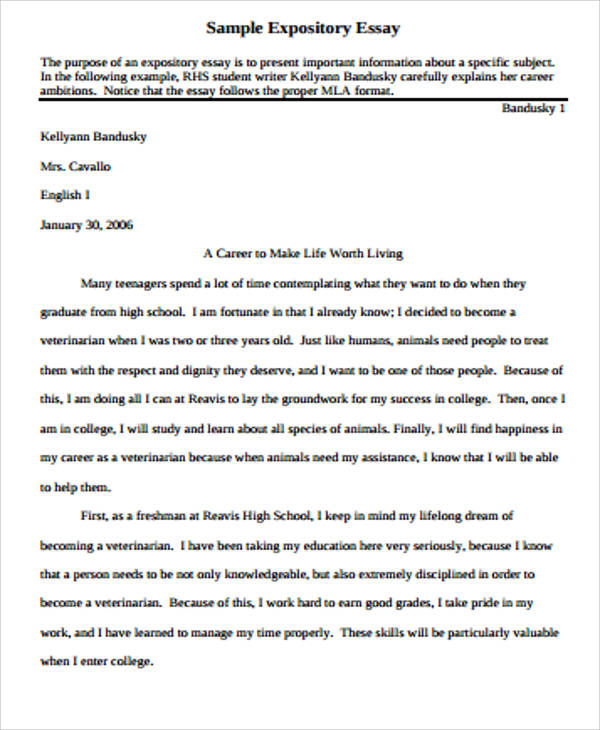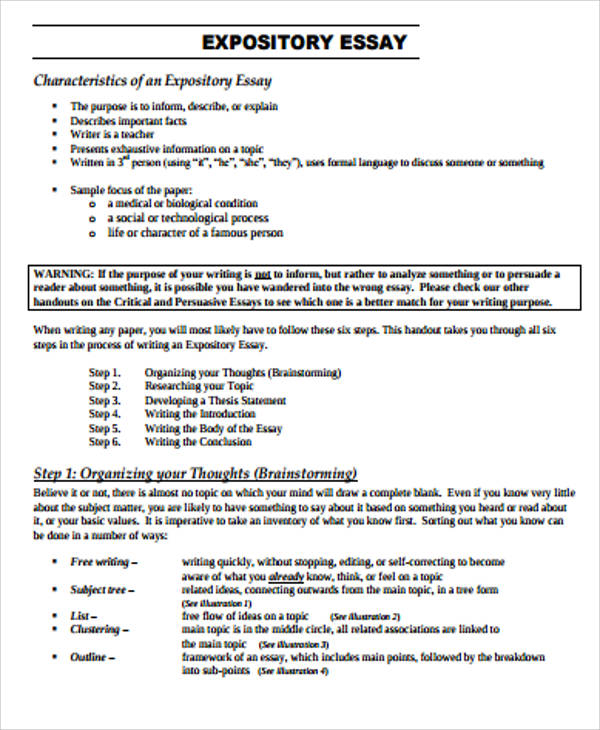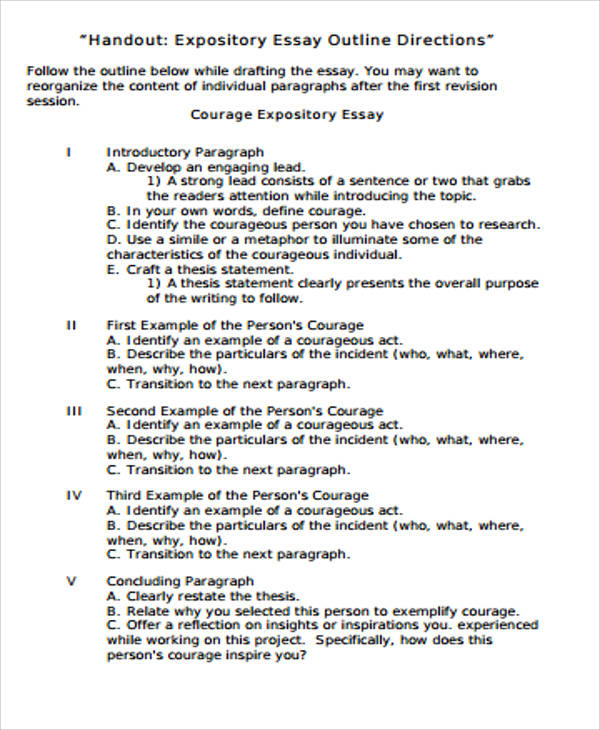An expository writing, from the root word expose, aims to explain or expose a subject at hand. This type of writing is fairly common with newspapers, magazine write-ups, manuals, textbooks, and other forms of essays or write-up that seeks to explain specific topics.
- Useful Writing Templates
- Free Writing Samples
Oftentimes they are used for academically related requirements. At some point in your student life, you have probably written one without you really realizing that it is one. Just like any type of essay, it has an introduction wherein a thesis statement is stated, a couple of paragraphs where details such as evidence are reflected, and a conclusion that restates and summarizes the main points of the essay you have written.
When you are writing an expository essay, you would want to assume that you are explaining topics to people who are clueless about the topic you have chosen. So you want to make sure that you write as many details as you can and discuss everything in the most comprehensive manner. You may also see essay writing samples and templates.
Quick Trivia: Did you know that most of the articles we have on this website is written in an expository manner? Awesome, right? Need more samples? Check out the sample expository essays that we have in this article.
Social Media Expository Essay
Expository Argumentative Essay
Expository Essay Rubric Format
Expository Essay Outline Form
What Is the Purpose of Expository Writing?
The purpose of an expository writing is to ensure that topics are explained in a detailed, logical, and straight to the point manner. They tend to just be neutral and do not take positions as opposed to argumentative writing wherein there is a need for you to take a stand, stick to it, and defend it all throughout the essay. In short, everything is based on facts instead of opinions.
As mentioned earlier, this is common in academic situations. Your teacher will probably ask you to write academic essays that would explain a certain topic. For example, your teacher might ask you to write about what the process of photosynthesis is all about or how technology has changed the lives of people as time went by. There is no need for you to come up with an argument or an opinion. All you need to do is to explain. Simple as that. That is all that you need to do. Simple. However, do not expect that since this type of writing is based on facts that it will be an easy ride. Some topics may be easy ones while others might take an extensive research process. We will discuss everything with you in the later part of this article.
What Is the Structure of an Expository Essay?
To ensure a well-written expository essay, you need to make sure that your essay has the following characteristics.
1. Have a clear and defined thesis statement that can be found in the first paragraph of the essay
You want to make sure that your thesis statement is clear, concise, and brief that will properly represent the topic and the information that you would like to share with your readers. This part of the essay is probably one of the most difficult ones to master. So you have to make sure that you have this in the bag already to make sure that you will be able to come up with a well-written expository essay.
2. Cohesive transitions in between paragraphs
Typically, a five-paragraph essay is common. You want to make sure that you are able to transition from one paragraph to the next one in a smooth flowing manner. By doing so, the reader will be able to follow the information in a clear manner.
3. Evidential support is important
The evidence that you will be presenting will be the one that will actually make your essay more solid especially since expository essays are based on facts. This also makes your essay clearer and will also provide a direction to where you want to end up.
4. Be creative
This will help to eliminate any robotic-like tone that is common when it comes to essays. By being creative, you will be able to leave a lasting impression to the reader of your essay.
5. Write a good conclusion
The conclusion of your expository essay should not just restate the thesis statements and the main points that you have all across your essay. You want to make sure that this is the part of the essay that will leave the most impression on your reader. Stick to the information that you have already discussed in the body of your essay and synthesize the information that you already have.
You may also check out our related articles such as informative writing samples and templates and argumentative writing samples and templates.
What Are the Different Kinds of Expository Writing?
Alongside a narrative, argumentative, and descriptive essay, an expository essay is an essay that is an accepted manner of discourse especially in the academic setting. Some of the most common forms of expository writing includes cause-and-effect articles, descriptive essays, how-to articles, and articles showing comparison between topics.
1. Cause-and-Effect Expository Essays
A cause-and-effect write-up shows and describes the relationship between a certain cause and the underlying effects that it may have. It can be effects of historical causes, effects of personal choices, maybe even an environmental cause. It may also discover any hypothetical outcomes of certain causes.
2. Descriptive Expository Essays
From the word descriptive, a descriptive essay aims to describe a certain topic such as a person, an idea, an event, and just about anything under the sun. Essay assignments in school are typically descriptive expository essays. Common school essays that are descriptive in nature are book reports and autobiographies. When it comes to writing a descriptive expository essay, you want to make sure that you focus on one aspect at a time. This helps to make everything a whole lot more organized and more cohesive. Maintain a clear direction all throughout the essay. Make sure that you also include all the necessary background information that is relative to the topic at hand.
3. How-To Expository Essays
How-to essays are basically instructional essays. It gives you an explanation about how you should tackle certain tasks in a step-by-step guide that makes use of simple language that is easy to follow. Recipes and instruction manuals fall under how-to expository essays. Lengthy statements should be avoided. Keep general statements brief and concise for this type of expository essay.
4. Compare and Contrast Expository Essays
Compare and contrast essays aim to explore the attributes of two specific aspects or topics. Since it is a compare and contrast essay, similarities and differences of the two elements should be the bulk of your essay. This type of essay is typically very organized and breaks down the aspects in a point-by-point manner or a subject-to-subject manner.
Want to explore more about narrative essays? Check out our narrative writing samples and templates to give you a better outlook regarding this type of essay.
Expository and Narrative Essay
Expository Essay Sample
General Expository Essay Example
Sample Expository Essay Outline
How to Write an Expository Essay
Essay writing can be a task that can be quite a handful. We would like to make everything easier for you, so we would like to share a couple of tips when it comes to writing an expository essay.
1. Planning
Planning ahead is definitely a good way of ensuring that your expository essay ends up being a well-written one.
- Purpose. Make sure that you know the reason why you are writing an expository essay. If you are confused about why you need to do it, jot down a couple of possible reasons. If this was given as an assignment, you have to make sure that you check out the guidelines that were set out by your teacher.
- Know your audience. You want to make sure that you match the tone of your essay with that of your readers. Consider the interests of your reader to have a good idea about what you should include in your essay.
- Jot down ideas. Come up with a couple of ideas that you think would help to make your writing task a whole lot easier than expected.
- Come up with an outline. In line with making your writing task easier, you may want to come up with a simple essay outline. This will help to make everything more organized and you would know which one comes first.
- Research. Make sure that you look for reliable sources. Books, journals, research paper, magazines, newspaper clippings, and reliable websites that contain relevant details for your essay. Make sure that you evaluate the credibility of what you have researched and read everything carefully.
- Write down notes. As you go through your sources, make sure you take note which areas you think will be useful for your essay. Take note of the author, page number, and name of sources as well.
- Develop your thesis. Having a good thesis statement can help to make sure that you will be able to relay the main focus of your essay in an easier manner.
You may also like business writing samples and templates.
2. The Introduction of Your Essay
- Start with an engaging statement. This can either be a quote from a book or a literary piece. It can also be an anecdote. Doing this can help to catch the attention of the reader and encourage him/her to continuously read your essay.
- Provide background information. Background information is a definite must to ensure that you are able to give deeper context to your essay.
- Write your thesis statement. Your thesis statement is composed of one sentence only.
You may also see script writing samples.
3. Highlighting the Main Points
- Determine the number of paragraphs. Commonly, your essay will be composed of five paragraphs unless you have been told to provide lesser or more number of paragraphs. By looking at your essay outline, you will be able to determine the number of paragraphs that you will have in the essay. Once you know this, make sure that you are able to equally divide the main points you have across your whole essay.
- Start with a main point. Every paragraph of your essay must start with a main point to be able to establish what you want the reader to focus on in a certain part of the essay. Include supporting details alongside the main points and discuss this in the paragraph. Make sure you clearly elaborate on the details and give examples if you think it is needed.
- Analyze the evidence. Elaborate as to why the evidence is related with your thesis statement. Make sure that you let your audience know everything that they need to know.
- Conclude in a smooth manner. Concluding your essay in a smooth manner is highly needed. You want to make sure that it will be cohesive and will also help to give sense to the next paragraph. This way, you are sure that the paragraphs will all make sense.
You may also like speech writing samples and templates.
Ending Your Essay
1. Review your thesis
Check out whether the evidences that you have presented are in line with the thesis statement that you have written. Rechecking your thesis statement will also help to determine if there is a need to make revisions in the body of your essay or if you need to rephrase your thesis statement instead.
2. Summarize and synthesize
Make a summary of all your main points and synthesize how they are related to each other and why they are relevant to your thesis statement and to your overall topic. There is no need for you to introduce new information in the conclusion.
3. End with a bang
If you start with a memorable statement, make sure that you also end with a memorable statement. Your ending statement should be a final statement about your topic. This can also be a call to action or what the readers should expect right after reading the essay.
You may also check out summary writing samples and templates.
We hope we have helped you out with your struggles when it comes to writing an expository essay. If you still find yourself unsure about expository writing, you should ask your professor or you may also ask someone you know who may have experience with writing expository essays.
If you need a guide when it comes to persuasive writing, check out Persuasive Writing Samples and Templates.
Related Posts
Sample Business Card Templates
Sample Cashier Job Descriptions
Questionnaire Samples
FREE 10+ Sample HR Resource Templates in PDF
FREE 10+ HR Consulting Business Plan Samples in MS Word | Google Docs | Pages | PDF
FREE 49+ Sample Job Descriptions in PDF | MS Word
FREE 16+ Nonprofit Budget Samples in PDF | MS Word | Excel | Google Docs | Google Sheets | Numbers | Pages
FREE 13+ Academic Calendar Templates in Google Docs | MS Word | Pages | PDF
FREE 10+ How to Create an Executive Summary Samples in Google Docs | MS Word | Pages | PDF
FREE 23+ Sample Event Calendar Templates in PDF | MS Word | Google Docs | Apple Pages
Company Profile Samples
FREE 10+ Leadership Report Samples [ Development, Training, Camp ]
FREE 24+ Sample Payment Schedules in PDF | MS Word
FREE 10+ Return to Work Action Plan Samples in PDF | DOC
Autobiography Samples & Templates

